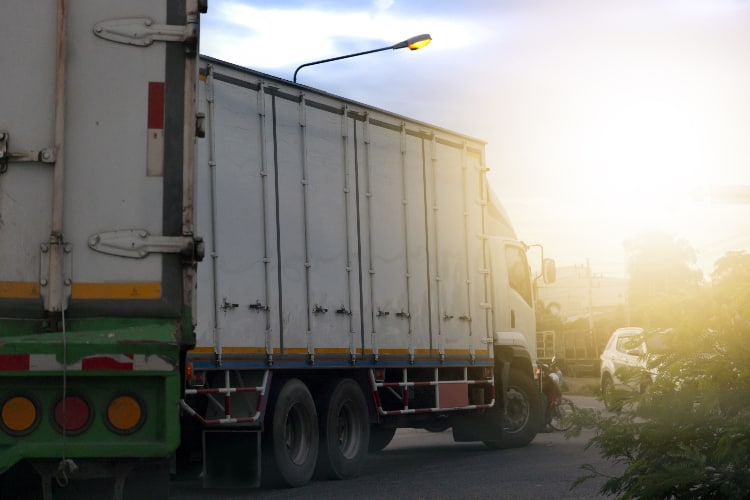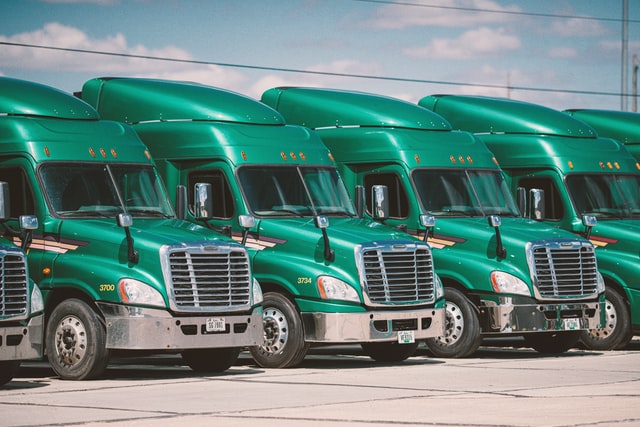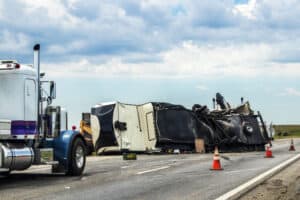When Is It Safe for a Truck Driver to Make a U-Turn in Texas?
July 30, 2023
18-Wheeler U-Turns Are Risky. Here’s Why & How to Avoid U-Turn Truck Accidents.
U-turns are tricky in any vehicle, but they can be incredibly risky in massive tractor-trailers. With more height, weight, and length than standard vehicles, 18-wheelers simply can’t make all of the same U-turns that passenger vehicles can. Sometimes, that’s clear because:
- Traffic signs and laws may prohibit trucks from making U-turns in certain areas.
- Some motor carriers may have policies banning their truckers from making certain types of U-turns.
That doesn’t mean that everyone knows and follows the rules, nor does it prevent U-turn truck wrecks. Here’s why and what you can do to:
- Safely make U-turns as a truck driver.
- Protect yourself if you’re ever by a trucker who’s making a U-turn.
- Avoid U-turn 18-wheeler accidents at all costs.
Dangers of U-Turns for Trucks & Big Rigs

- Are not agile: Big rigs don’t accelerate, stop, or turn on a dime. It takes time and effort to maneuver these vehicles, especially in tighter spaces. It can also take skill for truckers to determine when safe U-turns are possible and how to navigate these maneuvers.
- Have bigger blind spots: Smaller vehicles can disappear in these “no zones.” If truckers are making U-turns, that can mean shifting blind spots and greater risks for those near the turning big rig.
With these risks, trucks making U-turns can present several dangers, raising crash risks by:
- Blocking traffic: One big rig making a U-turn can block several lanes of traffic. It could even stop traffic in one direction on a single-lane, double-lane, or multi-lane roadway. With that, traffic can back up. That’s a best-case scenario on a busy Texas road. If drivers make mistakes or bad calls, however, multi-vehicle U-turn truck wrecks can happen in seconds.
- Reducing the trucker’s visibility: U-turns are one of the widest turns truckers can make. As they traverse these turns, truckers may not have any way of seeing or avoiding what’s in their shifting blind spots.
- Blocking other motorists’ views: Other drivers may not see a turning truck until it’s too late to avoid a crash. That’s especially true at certain times of day, in adverse weather, or when the roads are really curvy. Similarly, drivers may not be able to see around trucks making U-turns, preventing them from anticipating potential risks or traffic changes beyond the 18-wheeler that’s blocking their view.
- Making multiple adjustments: It’s not uncommon for truckers to have to shift into reverse at least a couple of times while making U-turns. This back-and-forth action can be unexpected for those surrounding the truck, especially if it’s difficult to see the big rig’s lights or hear its reverse beep warnings from certain positions.
- Taking time to pick up speed: Right after 18-wheelers complete a U-turn, they’re going to crawl up to speed. That lag could be problematic if other motorists are speeding or distracted. It can also lead to accidents if other drivers suddenly come up on slower trucks because of sharp curves, hills, or other roadway features.
What Types of 18-Wheeler Accidents Can Result from U-Turns?
Trucks making U-turns can be involved in all types of 18-wheeler wrecks, including (but not limited to):
- Underride truck accidents: If other drivers don’t see a truck making a U-turn, they may slam right into the side of a big rig, getting trapped beneath it. These underride accidents are often serious, if not deadly, with the tops of vehicles routinely sheared off, even at slower speeds. Underride accidents during U-turns are more likely to happen at night or when trucks don’t have reflective tape (or underride guards) on their sides.
- Rear-end truck accidents: Other drivers may rear-end trucks that are mid-U-turn if those other drivers are distracted or if they misjudge the truck’s speed. These types of crashes can also happen when big rigs have just finished U-turns but they aren’t fully up to speed yet.
- Head-on collisions: Tractor trailers and other vehicles can crash head-on if big rigs making U-turns get stuck and/or if other drivers try to unsafely maneuver around turning big rigs.
- T-bone wrecks: Other vehicles and trucks can T-bone U-turning trucks, especially in intersections — and if the signals change more than once before the U-turn is complete.
- Pileups: Multiple vehicles can crash and pile up when U-turn truck accidents happen in high-traffic conditions. These wrecks are also more likely to occur when the roads are slick or visibility is low.

- Inexperienced truckers who don’t know how to safely make U-turns
- Careless or reckless big rig drivers who ignore U-turn risks and make the dangerous U-turns
- Distracted, impaired, or fatigued drivers, including truckers and/or other motorists on the roads
- Motor carriers that fail to train truckers and/or that hire risky drivers
- Dangerous roadway design or a lack of traffic signage to warn against making U-turns in certain areas
What Are Uncontrolled U-Turns?
If there isn’t a spotter to help a trucker make a U-turn, it’s an uncontrolled U-turn. Spotters can be truckers’ eyes, helping them navigate blind spots while safely completing U-turns (and other trickier maneuvers). So, if there is a spotter, it’s a controlled U-turn. Without a spotter, it’s an uncontrolled U-turn. Generally:
- Uncontrolled U-turns should not be attempted.
- Many motor carriers prohibit uncontrolled U-turns as a policy.
- Truckers should only make U-turns with a spotter.
- If truckers don’t have a spotter, they should go around the block, find an alternate exit, or look for another way to safely reroute their tractor-trailers.
- If truckers aren’t sure about whether or not they can safely make a U-turn, they should NOT attempt the maneuver.
When Are U-Turns in Trucks Safe in Texas?
U-turns in trucks can be safe in Texas whenever:
- The roads are wide enough, and there’s sufficient space for a big rig to complete the U-turn.
- There’s visibility in all directions, meaning that truckers can clearly see approaching vehicles — and the drivers of those vehicles can clearly see a U-turning truck, adjusting as needed (assuming they’re alert and paying attention behind the wheel).
- There aren’t any posted traffic signs prohibiting U-turns.
Of course, those aren’t the only conditions necessary to ensure safe U-turns on Texas roads, and even just one mistake could lead to serious U-turn truck accidents.
Improving U-Turn Trucking Policies
Many motor carriers go the extra mile to abide by safety rules and minimize crash risks. Not all do, however, and for some, that means:
- No policies regarding controlled versus uncontrolled U-turns in trucks
- Little to no training for truckers on how to make U-turns
- Safety policies coming into play only after U-turn truck accidents happen
Trucking companies, truck drivers, and others can be liable for their oversights, risky choices, and lack of policies or training when those factors cause big rig wrecks. Others may be liable too.
After an 18-Wheeler U-Turn Accident
You may not know anything about motor carriers’ U-turn policies after a wreck — or whether truckers followed the rules, had the right training, or were simply responding to other dangers in the moment.
That’s why it’s crucial to investigate U-turn truck wrecks. It’s also why talking to a truck accident lawyer can be prudent if you or someone you love has been hurt in a U-turn wreck. An attorney can help you determine fault, your legal options, and how to protect your rights moving forward.

